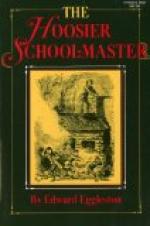“Looky here, marm,” said Bud, “it seems to me you’re a-makin’ a blamed furss about nothin’. Don’t yell so’s they’ll hear you three or four mile. You’ll have everybody ’tween here and Clifty waked up.” For Mrs. Means had become so excited over the idea of being caught allowing Hannah to go to spelling-school that she had raised her last “Ketch me!” to a perfect whoop.
“That’s the way I’m treated,” whimpered the old woman, who knew how to take the “injured innocence” dodge as well as anybody. “That’s the way I’m treated. You allers take sides with that air hussy agin your own flesh and blood. You don’t keer how much trouble I have. Not you. Not a dog-on’d bit. I may be disgraced by that air ongrateful critter, and you set right here in my own house and sass me about it. A purty fellow you air! An’ me a-delvin’ and a-drudgin’ fer you all my born days. A purty son, a’n’t you?”
Bud did not say another word. He sat in the chimney-corner and whistled “Dandy Jim from Caroline.” His diversion had produced the effect he sought: for while his tender-hearted mother poured her broadside into his iron-clad feelings, Hannah had slipped up the stairs to her garret bedroom, and when Mrs. Means turned from the callous Bud to finish her assault upon the sensitive girl, she could only gnash her teeth in disappointment.
Stung by the insults to which she could not grow insensible, Hannah lay awake until the memory of that walk through the darkness came into her soul like a benediction. The harsh voice of the scold died out, and the gentle and courteous voice of Hartsook filled her soul. She recalled piece by piece the whole conversation—all the commonplace remarks about the weather; all the insignificant remarks about the crops; all the unimportant words about the spelling-school. Not for the sake of the remarks. Not for the sake of the weather. Not for the sake of the crops. Not for the sake of the spelling-school. But for the sake of the undertone. And then she traveled back over the three years of her bondage and forward over the three years to come, and fed her heart on the dim hope of rebuilding in some form the home that had been so happy. And she prayed, with more faith than ever before, for deliverance. For love brings faith. Somewhere on in the sleepless night she stood at the window. The moon was shining now, and there was the path through the pasture, and there was the fence, and there was the box-elder.
She sat there a long time. Then she saw someone come over the fence and walk to the tree, and then on toward Pete Jones’s. Who could it be? She thought she recognized the figure. But she was chilled and shivering, and she crept back again into bed, and dreamed not of the uncertain days to come, but of the blessed days that were past—of a father and a mother and a brother in a happy home. But somehow the school-master was there too.




